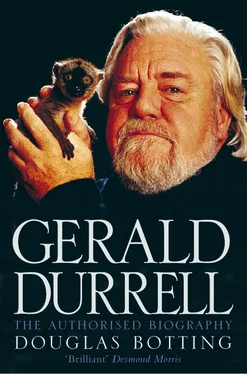But like all unspoiled Edens, the island had its drawbacks. ‘The peasants are incorrigible thieves and liars,’ Lawrence noted soon after his arrival at Perama, ‘but make up for it by having the dandiest arse-action when they walk. This is due to always carrying huge weights on their heads.’ Lawrence soon changed his opinion of the Corfiots, and the family grew very close to many of them. But the Corfiot world took some getting used to, as Gerald was later to explain:
Corfu was wonderful because it was so lunatic, so insane. When a man in a shop said, with the Corfiot’s gentle charm, he would have a thing ready for you tomorrow, he was working in a world that would have mystified Einstein. The word tomorrow might mean half an hour later or two weeks or two months hence or, indeed, never. The word tomorrow had no normal meaning. It became yesterday, last month, the year after next. It was an Alice in Wonderland world.
Greece was not a mass holiday destination in those days – too far, too rough – and the few tourists who could afford to go abroad tended to make for Italy. Greece, therefore, remained a primitive backwater by European standards, and a foreigner contemplating setting up residence there confronted some hefty practical problems, even on Corfu.
Corfu before the discovery of DDT, Lawrence was later to point out, was ‘one large flea – one enormous hairy gnashing flea – and several kinds of bedbug as well, mostly elephant-sized’. In some ways, he reckoned, the island was almost as primitive as Africa, what with the insects, the malaria, the heat in summer and the rough going underfoot. In a remote Greek village a visitor was deep in the Middle Ages as far as medical matters were concerned, and if you fell ill it was up to the local ‘good women’ – masseuses, cuppers, bonesetters and specialists in herbal cures – to pull you round. Though there were qualified medics in the more civilised parts, going to see a Greek doctor, Gerald was to recall later, was ‘like going over Niagara in a barrel’. Roads were few, mostly dirt and caked in three inches of white dust; those that led up to the north were hard going even in summer and sometimes washed away in winter. Transport to the remoter parts of the island’s coast was best left to the passenger fishing boats called caiques, but in winter if the sea was rough the caiques stopped sailing.
For the Durrells, living a short car ride from Corfu town, life was less primitive. Fruit and vegetables – potatoes, corn, carrots, tomatoes, green peppers, aubergines – were cheap and abundant in season, and there was a rich variety of fresh fish to be had every day. But even at the best of times there was no butter, and the milk was goats’ milk. Chickens were thin and scrawny, beef was non-existent, though there was always good lamb and sometimes pork. Almost the only tinned food was peas and tomato paste, and the bread was heavy, grey, coarse and sour. There was no gas, electricity or coal. Heating for cooking was mostly charcoal, so that it took twenty minutes to boil a kettle for a cup of tea, and the ironing was done by maids using huge black charcoal irons. Light came from oil lamps, which filled the room with their distinctive smell, and oil stoves were used in winter to warm the rooms, along with wood fires. On special occasions the family would buy huge church candles for the veranda and garden, and set hollowed-out tangerines on the dining table with a little wick in oil inside. There were no refrigerators on Corfu, but Mother had an icebox which Spiro would refill with a huge block of ice he brought from town. Otherwise the best place to keep foodstuffs cool was the bottom of a deep well, or failing that a sea cave. ‘Sometimes it was so hot,’ Lawrence recalled, ‘that we carried our dinner table out into the bay and set it down in the water. It was cool enough if you sat with the water up to your waist while you dined. The water was so still and clear that the candles hardly moved on such summer nights. And the bronze moon was huge.’
Corfu’s compensations enormously outweighed any drawbacks. Their rent was cheap (£2 a month for a large house overlooking the sea), and so was food. ‘There is a good peasant wine,’ Lawrence reported to Alan Thomas, ‘which tastes and looks like iced blood. It costs 6 drachs – 3d per bottle. What more does one want? In England I couldn’t buy a bottle of horse-piss for 3d. Yesterday we dined very royally on red mullet – as you know a most epicurean dish – it cost Iod.’ Clothes were casual for the most part. Gerry wore shorts throughout his time on the island, and usually kept his hair very long, as he hated going to the barber in town. When an admirer gave Margo a large silk shawl she did not care for, Gerald appropriated it and pinned it round his neck like a cloak when he went out riding on the village pony. The shawl had a pattern in gold, green, red and purple, and a long red fringe. ‘I thought I cut a hell of a dash,’ he recalled, ‘as I galloped round the countryside.’
Generally the Durrell abodes on Corfu were sparsely furnished. All the rooms had bare floorboards which were scrubbed once a week in rotation and holystoned, and all the bedclothes were hung out of the windows each day to air. The furniture was mostly simple, rural and Greek, with the addition of a few exotic Indian items that Mother had brought out from England – deep blue curtains with huge peacocks on them; ornate round brass tables, intricately embossed and standing on elaborately carved teak legs; ashtrays decorated with peacocks and dragons.
At a domestic level the family’s life on Corfu was simple, uncluttered, unhurried, unpressured. At a more exalted level, the island was gloriously beautiful, utterly unspoilt, a paradise on earth surrounded by an unpolluted crystalline sea. For Gerald, it was a revelation:
Gradually the magic of the island settled over us as gently and clingingly as pollen. Each day had a tranquillity, a timelessness about it, so that you wished it would never end … In those days I lived a curious sort of triple life. I dwelt in three worlds. One was the family, one was our eccentric friends, and the third was the peasant community. Through these three worlds I passed unobserved but observing.
For Gerald, Corfu was a kind of Mediterranean Congo peopled with natives and crawling with wildlife, where every foray was a venture into the interior, and every bend in the track and view through the trees portended something utterly new, unexpected and absorbing.
The family had decided on a six-month trial period to see if they liked Corfu and wanted to stay. Gerald remembered this as a time of pure freedom, a total holiday – no lessons, no duties, no set hours, just carte blanche to roam at will, exploring the wonders of his paradise island. As the weeks of that first enchanted summer of exploration and discovery went by he increased the range of his excursions away from the Strawberry-Pink Villa.
Every day began with the rising sun striking the shutters of his bedroom windows, followed soon after by the smell of a charcoal fire in the kitchen, cock-crows, yapping dogs, goats’ bells clanging as the flocks wended their way to their grazing grounds. After a breakfast of coffee, toast and eggs under the tangerine trees Gerald would put on his Wellington boots – Mother, having been brought up to dread snakes in India, insisted he wore these in the early days – and saunter forth in the cool of the morning, his butterfly net in his hand, empty matchboxes in his pockets, following the black, bouncing form of Roger the dog, his constant and dearly beloved companion on all his forays.
Within a six-mile radius of the villa Gerald became the local equivalent of the town crier, or a sort of itinerant human newspaper. In those days some of the peasant communities would only see each other once or twice a year at fiestas. So, travelling around as he did, it was Gerald who brought the news from village to village – how Maria had died and how Spiro’s potato crop had failed (that was Spiro with the blind donkey, not Spiro with the Dodge convertible). ‘ Po! Po! Po! ’ the villagers would cry in horror – ‘and he has the whole winter stretching before him, potatoless. St Spiridion preserve him.’
Читать дальше











